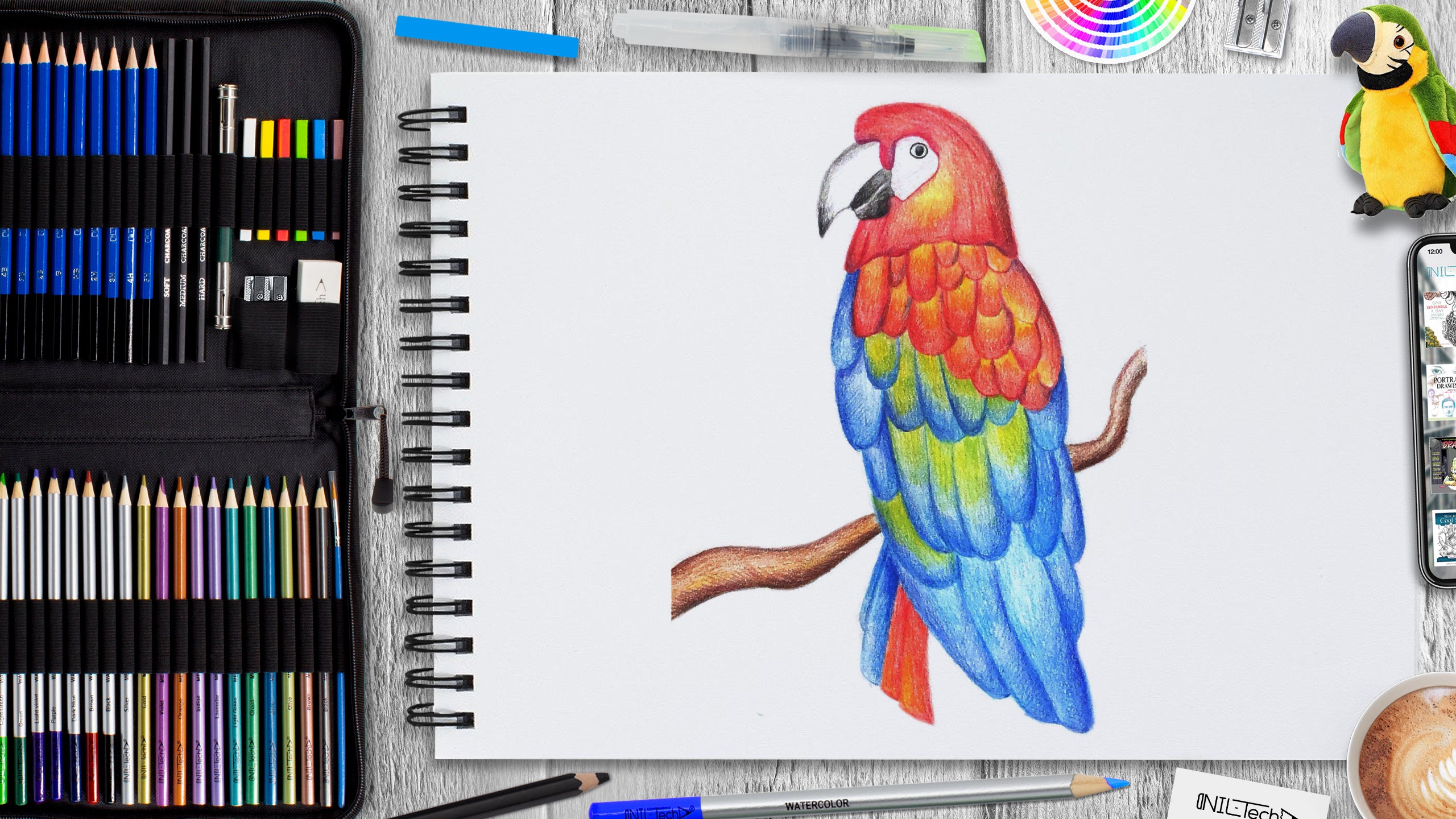
How to Draw a Parrot
Nov 04 , 2020

Hi everybody, welcome to a new NIL-Tech drawing tutorial: "Parrot". Pet parrots can be extraordinary if requiring pals. However, for individuals much more accustomed to fluffy animal buddies, they can provide some unexpected challenges. The long-lived, smart, and highly social birds require exceptionally high amounts of interest and enrichment. Otherwise, they can pick up bad habits and find themselves bored as well as stressed to the point where they pluck out their very own feathers.
Here are some interesting facts about Parrots:
1. Parrots Eat With Their Feet. All birds have an impressive grip, yet only the parrot can hold food as much as their beak while consuming. They can grasp onto their food with one foot and then move it as much as their beak so they can nibble on it. Parrots consume similarly to how we do. Their fleshy toes act a lot like how human fingers do.
2. Many Parrots Can Imitate Sound. Parrots imitate audio to ensure that they can fit in their surroundings. These social birds do not like to feel like they're missing out. They imitate audios they hear around them to communicate. They don't have vocal cords as human beings do. So they use the muscles in their throats to route the air differently. This allows them to resemble noises such as a ringing phone, creaking door, or a barking dog.
3. Parrots Can Live For Over 60 Years. The bigger the parrot, the longer their life generally is. For instance, the African Grey is known to live well beyond 60 years old. Macaws typically live between 25-50 years, while medium-sized parrots live between 15-20 years. Pet parrots commonly live longer than wild ones since they have fewer risks from predators and illness. The life expectancy of a family parrot is around 30 years, with many exceeding this.
4. They Mate for Life. As soon as a male and female parrot get together, they typically stay together, even beyond the breeding season. The only time they separate is if they can't have a baby or if their partner passes away.
5. The Kakapo Parrot Can Not Fly. This is the largest kind of parrot. It can weigh approximately 9lbs and grows to over 2 feet long. It's the only member of the parrot family that can't fly. It's also the only nighttime parrot, which is because it can escape prey much easier during the night. The Kakapo is fantastic at jumping and climbing up trees. This parrot is very rare, with only around 142 believed to be left on the planet.
In this tutorial, we used the following supplies:
- B pencil
- colored pencils
- blue (light and medium)
- red
- green
- yellow
- carrot
- burgundy
- cyan
- black
- brown (medium and dark)
- ocher
- White Vinyl Eraser
- Kneaded Eraser
STEPBYSTEP10
Let's draw a "Parrot" step by step

Step 1. With circles, outline the head and body of the parrot (pencil B).

Step 2. Over the circles, draw a brighter contour of the shape and the beak (pencil B).

Step 3. Draw details such as feathers, an eye, a branch, and so on (pencil B). Erase all excess construction lines.

Step 4. With a nag or eraser, make the contour almost invisible and draw it over with colored pencils (colored pencils: blue, red).

Step 5. Let's start hatching the plumage of the parrot. Most of them will be red and blue, and only a few blue feathers will have a splash of green (colored pencils: red, blue, green).

Step 6. Start adding details to the drawing. Draw shadows and enhance the color. On red feathers in the light areas, we use the carrot and yellow colors in the shadows - burgundy and blue. On blue feathers, use light blue in light areas and blue in shadows. In the green spaces, brighten the color and add yellow (colored pencils: red, yellow, carrot, burgundy, blue, cyan, green).

Step 7. Add the final details. Hatch the beak and eye with a black pencil. Draw a branch using brown shades and ocher in light areas (colored pencils: black, brown, dark brown, ocher).

 |
Drawing Pencil SetExcellent GIFT IDEA - Non-Toxic and safe, easily portable and made with quality top-notch materials. Basic and innovative drawing supplies come together in NIL Tech set as an exceptional replacement for old-fashioned pencil boxes. The main attraction at any occasion from your drawing enthusiast friends, sketchers, artists to your kids or students boosting their creative projects and enjoy their ear-to-ear smile! |







1 Comments
such beautiful parrot